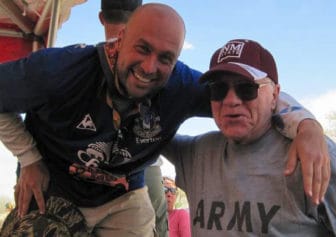COMMENTARY: I strongly believe that no government should stop a terminally ill, mentally competent adult from making their own end-of-life choices.

Courtesy photo
Bill McCamley with his dad after the Bataan Death March in 2013.
My dad died in 2014. In 2010 he was diagnosed with a nerve-degeneration disorder similar to Lou Gehrig’s Disease. When he died it hurt. Bad. Anyone who has lost a loved one knows the feeling — and yes, I am crying a little bit writing this.
When he was first diagnosed, our family thoroughly discussed his wishes. From that conversation came a document, an advance directive, which stated how he wanted to die. This process made sure that our time left with him was spent enjoying each other’s company and not making difficult decisions in times of extreme sadness and pain.
For me, this means memories of sadness — seeing his motor skills and speech decline — are far overshadowed by the happiness of things like going to NMSU games and high-fiving him.
His directive stated clearly that no artificial means were to be used in keeping him alive; he wanted control over his dying process… just like he did with his life.
Everyone, like my dad, who believes in end-of-life options owes a debt of gratitude to Britney Maynard. A brave, powerful, 29-year-old woman, she was diagnosed with fatal brain cancer and wanted to make a decision that would result in the least pain and most happiness for her and her family.
However, Ms. Maynard, a Californian, had to travel to Oregon because at the time it was illegal for her to even talk to a doctor in her home state about death with dignity. On Oct. 5, almost one year after her death, Gov. Jerry Brown signed the End of Life Option Act, authorizing medical aid in dying in California in large part due to her efforts advocating for the issue.
Soon New Mexico will have the same opportunity.
I want to point out that death with dignity is not suicide. Laws that allow for a doctor to aid a patient in dying state clearly that a patient has to be diagnosed with a life-ending disease.
It is something Americans overwhelmingly support, with a recent Gallup Poll showing 70 percent of Americans in favor. A December WebMD survey shows that for the first time a majority of physicians are now in favor. And in addition to California, three other states now allow the process, with serious efforts underway in 16 other states and the District of Columbia.
Many faith leaders are in support as well, not believing that God wants people to suffer. Archbishop Desmond Tutu, a Nobel Peace Prize recipient, is an example, saying, “I revere the sanctity of life — but not at any cost. … People should die a decent death. For me that means having had the conversations with those I have crossed with in life and being at peace. It means being able to say goodbye to loved ones — if possible, at home.”
On Oct. 26, the New Mexico Supreme Court will hear arguments on a case about this issue. A judge in Albuquerque ruled in 2012 that every New Mexican has the right to determine end-of-life decisions for themselves, but that decision was overturned by the Court of Appeals.
If the Supreme Court decides against letting a competent, terminally ill person make such a choice, I will be introducing a constitutional amendment doing so in 2016.
In a decision this personal, voters should have the right to decide for themselves the answer to a simple question; if we are in pain with a disease like cancer or ALS, should we have the freedom to choose how we die?
I know just how much better life is when individuals can make their own choices regarding dying. I hope everyone in our state will soon have that right.
McCamley is the state representative for District 33.